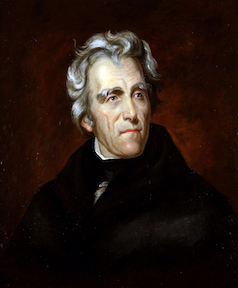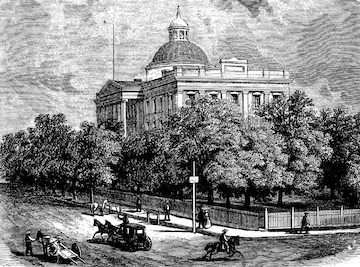The Secession of Mississippi

January 9, 2020, is the 160th anniversary of the secession of Mississippi
Named for war hero Andrew Jackson, Jackson, Mississippi, was founded in 1821 at the intersection of the Natchez Trace and the Pearl River. Jackson himself had come through the area twice, both times marching along the Trace while campaigning during the War of 1812. The city’s importance as a transportation hub only grew over time as the state’s railroad network converged there, turning Jackson into an ideal manufacturing center. The city’s relative geographic centrality made it an ideal location as the state capital.
As a result, a town named for a man who once declared “Our Union—It Must be Preserved” ironically became the site of Mississippi’s secession vote on January 9, 1861.

Mississippi became America’s twentieth state on December 10, 1817. By December of 1822, the new state capitol was ready, and the legislature convened there for the first time on the 23rd, just two days before Christmas.
By 1861, Mississippi had become the largest cotton-producing state in the country, and Jackson, at the intersection of the Southern Railroad of Mississippi and the New Orleans, Jackson, and Great Northern Railroad, became its hub. Cotton, said the state fathers, was “the product which constitutes by far the largest and most important portions of commerce of the earth.” The increasing demand for cotton produced an increasing demand for slave labor to harvest it. According to the 1860 census, of the state’s 791,305 people, 354,674 were free and 436,631 were enslaved—55 percent. Jackson, by that time, had grown to a population of just under 3,200 people.
There, on January 7, 1861, following the news of Lincoln’s election as president in November and the secession of South Carolina in December, the Mississippi state legislature met to debate the state’s future. On January 9, legislators ignored the call of the city’s namesake and decided that, no, “Our Union” didn’t need to be preserved after all.
They passed an Ordinance of Secession by a vote of 83-15, but the legalistic document, written by former Congressman Lucius Quintus Cincinnatus Lamar (II), didn’t capture the full intent of the assembly. To explain their “momentous step which our State has taken of dissolving its connection with the government of which we so long formed a part,” the convention issued “A Declaration of the Immediate Causes which Induce and Justify the Secession of the State of Mississippi from the Federal Union.”
“Our position is thoroughly identified with the institution of slavery—the greatest material interest of the world,” the document began.
Its labor supplies the product which constitutes by far the largest and most important portions of commerce of the earth. These products are peculiar to the climate verging on the tropical regions, and by an imperious law of nature, none but the black race can bear exposure to the tropical sun. These products have become necessities of the world, and a blow at slavery is a blow at commerce and civilization. That blow has been long aimed at the institution, and was at the point of reaching its consummation. There was no choice left us but submission to the mandates of abolition, or a dissolution of the Union, whose principles had been subverted to work out our ruin.
Worried that people would think they “overstate[d] the dangers to our institution,” the document went on to reference “a few facts.” What followed was essentially a bulleted list that outlined the ways the Federal government denied “the right of property in slaves.”
“The hostility to this institution commenced before the adoption of the Constitution,” the document said. Among the other grievances it outlined, the document said the Federal government “refuses the admission of new slave States into the Union, and seeks to extinguish it by confining it within its present limits, denying the power of expansion.”
The delegates felt they had no alternative but to secede. “Utter subjugation awaits us in the Union, if we should consent longer to remain in it,” they concluded. “We must either submit to degradation, and to the loss of property worth four billions of money, or we must secede from the Union.”
The hero of New Orleans might have rolled over in his grave.
Jackson’s famous toast to the Union came at an 1830 party celebrating Thomas Jefferson’s birthday. As the author of the Declaration of Independence, Jefferson had also authored the infamous Virginia and Kentucky Resolutions suggesting a state could overrule any Federal law it didn’t like. By 1830, a similar spirit ran through the government, spurred on by southern states, called Nullification. States could nullify the laws of the Federal government.
Jackson, a westerner and a slave-holder, thought Nullification to be balderdash. Many of its proponents, including his own vice-president, John C. Calhoun of South Carolina, attended the dinner, and observers expected fireworks over the matter. When it came time for Jackson to offer the night’s toast, he raised his glass for the preservation of the Union.
Calhoun’s turn came next. His rebuttal, while clever, had none of the force of Jackson’s pithy toast: “The Union: next to our Liberty the most dear: may we all remember that it can only be preserved by respecting the rights of the States, and distributing equally the benefit and burden of the Union!”
As a Civil War-era storyteller, Frazer Kirland, would later explain it, “In that toast was presented the issue—liberty before Union—supreme State sovereignty—false complaints of inequality of benefits and burdens—our rights as we choose to define them, or disunion.”
And so read the “Declaration of Immediate Causes” drafted in Jackson and approved on December 9: “our rights” as Mississippi chose to define them, secured only through “disunion.”
The date of that 1830 birthday party, by the way? April 13. Thirty-one years later on that same date, Fort Sumter would surrender to South Carolinian forces in Charleston harbor, marking the start of the Civil War.
————
(For more on Mississippi’s secession, read Timothy B. Smith’s The Mississippi Secession Convention from the University of Mississippi Press.)
Yet the lost cause said that the Civil War was about states rights. Indeed it was; the about the perpetuation of slavery.
The town I group in or nearby is also named Jackson, for the same reason Jackson, MS is. Andrew Jackson came through the area on his way to and back from New Orleans. Originally the place was named Bear’s Corner.
Secession happened in defense of slavery there too. Although, a goodly number of people voted against secession, just not enough.
I believe money and economies were the cause for secession and slavery was its by product . Please dont miss the point while on your high morale 20 century podium .
Only after the Civil War, did the Confederacy state that states rights and tariffs were the cause of secession.
When they left in 1860, it was because of slavery, and the election of Lincoln whom they feared, would abolish slavery. 4 states, Mississippi, Texas, Georgia and South Carolina even wrote in declarations of secession, that the reason they were leaving was because of slavery.
If you read the Cornerstone Speech by the VP of the Confederacy, Alexander H Stephens, it’s all there. Here is what he said…
The new Constitution has put at rest forever all the agitating questions relating to our peculiar institutions–African slavery as it exists among us–the proper status of the negro in our form of civilization. This was the immediate cause of the late rupture and present revolution […] The general opinion of the men of that day [Revolutionary Period] was, that, somehow or other, in the order of Providence, the institution [slavery] would be evanescent and pass away […] Our new Government is founded upon exactly the opposite ideas; its foundations are laid, its cornerstone rests, upon the great truth that the negro is not equal to the white man; that slavery, subordination to the superior race, is his natural and normal condition.
Unfortunately, the founders of the Confederacy left a written record as to why they left the Union.
Interesting that Jefferson Davis did not immediately follow his state out of the Union, waiting until 21 JAN 1861 to resign from the U.S. Senate. This perfidious practice was also followed by Senator Wigfall of Texas and John C. Breckinridge (who was expelled after joining the Confederate Army.)
Davis was working on the Crittenden Compromise in a last ditch effort to keep the Union together, but radical Republicans and Democrat Fire Eaters were too fired up by Lincoln’s election to compromise on slavery.
Lincoln also didn’t support the Crittenden Compromise. It would have protected slavery constitutionally forever. Davis stuck around to try and defend slavery just a bit longer, but Lincoln wasn’t going to support it having been elected on stopping the expansion of slavery.
Lyle Smith
Thanks for your concise, considered response.
To me, it appears as a clever game: “kick me out of the Senate, and you accept that my State has seceded. Let me alone and we can work through a compromise.”
The telegraph system was working, so the news of Mississippi seceding would have been known in Washington D.C. within 24 hours. I believe that same telegraph system brought news of the firing on U.S. flagged Star of the West (which occurred same day as Mississippi secession.) And what was taking place in America could be described as a game no longer…
Kindest Regards
Mike Maxwell
Chris,
I copied a portion of the declaration below and then will offer a brief comment: “The hostility to this institution commenced before the adoption of the Constitution,” the document said. Among the other grievances it outlined, the document said the Federal government “refuses the admission of new slave States into the Union, and seeks to extinguish it by confining it within its present limits, denying the power of expansion.”
In teaching a Civil War and Reconstruction class at a community college, one needs to simplify knowledge so that it becomes easier for students to comprehend. Thus, I inform my students that the war came about as a result of a political struggle between North and South over the future of the west, or more precisely, the western territories. The Mississippi declaration makes that clear and thereby offers additional support for the explanation of the coming of the war.
wow, so cool!